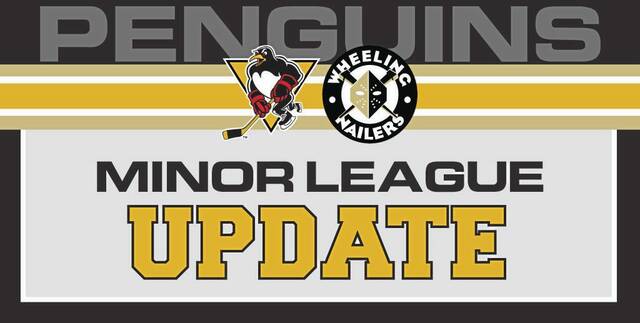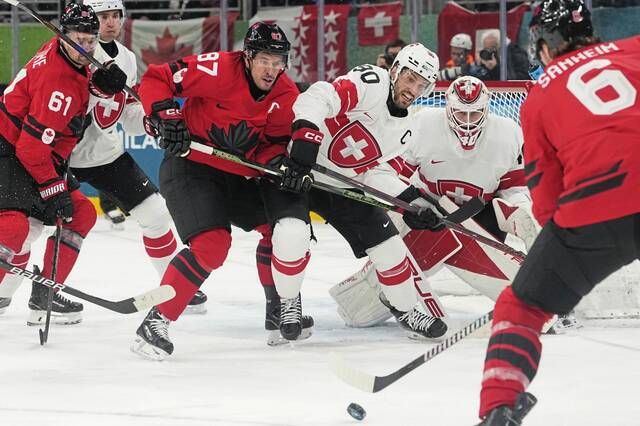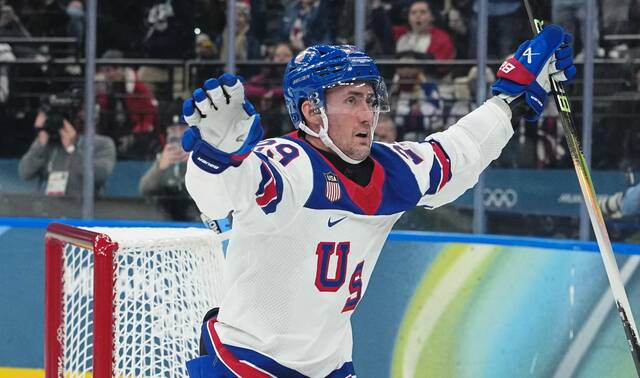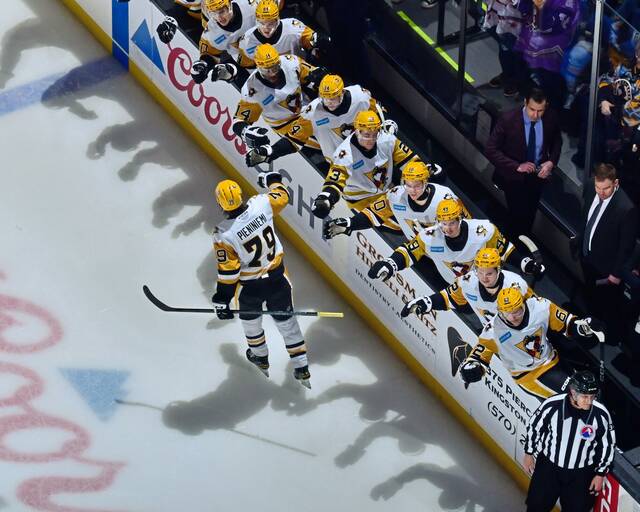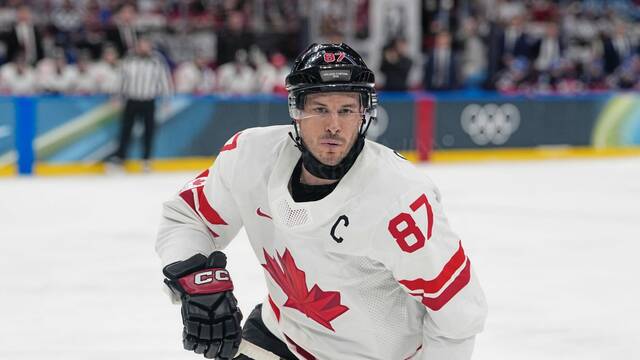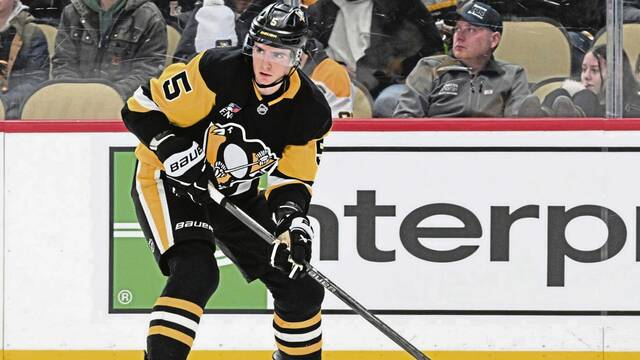If the call had come on the 10th anniversary of the Jaromir Jagr trade, Kris Beech may have had a different reaction.
He probably still would’ve done the interview. Just with a little less enthusiasm and a lot less perspective.
But after 20 years of reflection, the former Penguins forward was glad he took the call this week.
“It was a great time in my life, looking back on it,” Beech said from his home in British Columbia.
For a long time, Beech probably wouldn’t have had that kind of view about the Pittsburgh portion of his career. The disappointment. The failed expectations. The demotions.
Depression. Exhaustion. The eating disorder. Time on the waiver wire.
If that trade never happens, maybe things work out differently for him on the ice.
Or, maybe if that trade never happens, all his of underlying issues stay repressed and consume him in a more disturbing way. Maybe it would’ve been another two decades before he found his path to happiness and his own sense of who he is.
Now he’s the kind of guy who can be part of what some call the worst trade in Pittsburgh sports history and turn it into something he remembers as “a pretty cool thing in his life.”
Breaking news
Beech has no problem recalling where he was on July 11, 2001.
The 19-year-old was training with his brother, Ryan, in Port Moody, British Columbia. He was coming off a season in which he posted 66 points in 40 games with the Calgary Hitmen of the Western Hockey League.
He just had a four-game taste of NHL hockey with the Washington Capitals, an organization that drafted him with the seventh overall pick in 1999. Now it was an organization that was trading him for the most dynamic scorer in the game.
Caps head scout Ross Mahoney gave Beech the news that he was part of a trade that would send him to Pittsburgh with defenseman Ross Lupaschuk and forward Michal Sivek. In exchange, the Penguins parted with Jagr, a 10-time All-Star and five-time NHL scoring champion, and defenseman František Kučera.
Mahoney’s news was met with stunned silence from Beech. Not because he quickly grasped that he was the centerpiece of a deal for Jagr, but because he immediately understood he was going to be teammates with Mario Lemieux.
“I was going to meet my childhood idol and possibly play with him. The excitement exploded,” Beech recalled.
Sky-high expectations
Despite Jagr’s brooding end to 2001, trading him wasn’t necessarily something that Pittsburgh fans wanted. It was just something that had to be done.
Because of economics. Because of Jagr’s increasingly petulant personality. Because of an organizational need to get younger and look to the future.
However, Jagr was coming off his fifth Art Ross trophy thanks to his 121 points. The team made it to the Eastern Conference finals on the heels of Lemieux’s return to the ice after Christmas.
As a result, the club had to sell the public on the deal. That included general manager Craig Patrick saying Beech had the potential to turn into another edition of former Penguins Stanley Cup winner (and eventual Hall of Fame inductee) Ron Francis.
Penguins fans may have rolled their eyes at that comparison then. They certainly wince at it now.
“There was a lot of hype around me as a player,” Beech admitted. “I was getting compared to Guy Lafleur as an 11-year-old by an NHL scout. From there, the comparisons kept coming. Guys like Joe Sakic and Paul Kariya. Onto Washington with (general manager) George McPhee basically referencing he thought I could be the next Steve Yzerman.”
Beech’s friend and former Wilkes Barre/Scranton teammate Colby Armstrong understands how that comparison could be made.
“A really smart hockey IQ guy. A great playmaker,” Armstrong said of Beech Friday. “Poise. Size (6-foot-2, 209 pounds, almost the same size as Francis). Vision. Sweet hands. Great passes. Those sauce-flop passes. Like Phil Mickelson making a flop shot. He had that ability.”
By the end of his first Penguins training camp as a 20-year-old, Beech had been traded for Jagr, compared to Francis and put on a line with Lemieux.
Interestingly, that third experience may have been the hardest part for Beech to absorb, despite it being his lifelong dream.
“I found it was quite challenging to play with him,” Beech said. “I just felt like I was always looking for him. Always trying to get him the puck. I would get away from playing my own game.”
Beech went his first 22 games as a Penguin without scoring a goal. In their careers, Beech, Sivek and Lupaschuk played a total of 141 games for the Penguins, racking up just 13 goals and 33 total points. Jagr had those totals in Washington before the end of February of his first year.
Even though Jagr never got the Capitals to the heights they expected, the Penguins finished last in the Atlantic for four straight years.
The trade signaled the end of the Penguins’ run of glory during the 1990s. It was also emblematic of the franchise’s flailing attempts to remain solvent until the Sidney Crosby era began.
Beech’s failed expectations weren’t helping.
Dark days
Despite the challenges of his rookie season, Beech didn’t view the 2001-02 campaign with negativity. He saw the 79 games he played and 25 points he accumulated as a learning experience.
It was his demotion to the AHL the next season that he viewed as a kick in the head.
“It was a bit of a shock,” Beech said. “In terms of the hype, there was nobody to keep me grounded. That bar is what I set my sights on — being that type of franchise player. In my own mind, I thought I was already there. And I was far from it.”
Despite tallying 43 points in 50 games that year with Wilkes-Barre/Scranton, the demotion from the NHL club exacerbated some mental health problems Beech had been privately battling since his late teens.
The first was an eating disorder. Beech said it was the result of post-traumatic stress from a “personal life trauma” when he was 17 years old. Something he won’t talk about publicly. Something he has “made peace” with over his life.
“If I ate too much or too quickly, I’d throw up due to the nerves not being settled in my gut,” Beech said, pointing to how his inability to maintain a proper eating cycle often sapped his energy.
What occurred next was what Beech described as a four- to five-year battle with his mental health. The experience was made worse because it occurred during a stretch of time in his career when he was bouncing between the AHL and brief stints in the NHL. He went from Pittsburgh’s organization to Nashville’s, back to Washington’s and then to Columbus’, with the lockout in between.
“I was diagnosed with major depressive disorder at 26,” Beech said. “At 30, it turned out to be the wrong diagnosis. I was diagnosed with bipolar disorder. Most likely, I had been dealing with it for five or six years. I still manage it to this day. … It was like dealing with a 15-year injury that never went away.”
Even though Beech scooped up 28 points in 21 playoff games with the Hershey Bears in 2006 en route to a Calder Cup, that span of his career from 2002-2009 was marked by eroded self-esteem, a lack of confidence and feelings of failure.
“When you are dealing with someone with mental health issues, it’s a different beast,” Beech said.
To the degree that he felt he “hit a wall” and lost the joy for the game.
Changing his mind
The turning point came for Beech after his second stint with the Penguins at the end of 2008. Pittsburgh was his third team that year, where he managed 11 points in 25 games.
Instead of spending another year being tormented by anxiety over what team might cut, trade or sign him next, he went to play in Sweden. Where he could play with one team steadily. Where he met his wife, Emma. Where he won a championship with HV71 Jönköping.
It’s also where he discovered the benefits of mindfulness training. As described by the Mayo Clinic, mindfulness involves meditation exercises that include “breathing methods, guided imagery and other practices to relax the body and mind and help reduce stress.”
Things that Beech couldn’t do as a player for the previous eight years.
“It’s a skill. It’s a training. It’s a practice. You can put time in. It can make physical changes in the brain in positive ways,” Beech said.
Beech said the mental training exercises helped him so much that he reconnected with his love for hockey to the level that he played for 11 more years in seven countries across Europe.
“It’s a way of working out for the mind. As an athlete, that resonated with me. I knew how to commit to that kind of training,” Beech said.
Beech is such a believer that, upon his retirement back to British Columbia in 2016, he made connecting mindfulness and mental training to athletes his life’s work. He created the “Amiability Network for Life,” a web-based service designed to connect athletes and others who want to better hone their mental skills with medical experts and successful pioneers in the field.
For skeptics, the phrase “mindfulness” may conjure up an intangible, ethereal image of crystals, incense and hippie music. But Beech insists the benefits to some athletes can be immense and that the science behind the practice is strong.
“One of my colleagues (Arian Talwerdi) has contributed to some pretty phenomenal research at UCLA recently on Alzheimer’s and dementia patients,” Beech said. “With a simple 20-minute breath-awareness practice — 30 days in a row — they saw physical changes in parts of the brain responsible for decision making, emotional regulation and memory.”
As Beech says, it’s using your brain to “harness the elite athlete privilege” and get the most out of physical development and natural talents.
Looking back, maybe that was an ingredient that Lafleur, Francis and Yzerman had inherently all along. One Beech needed to perfect before making those comparisons accurate.
Silver lining
When it comes to the Jagr trade, you can call it mindfulness. Or two decades of retrospective analysis. Or just rationalization.
Whatever works.
For the Penguins, the return for Jagr was a major swing and miss. Yet without doing the deal, they may have never been in a spot to draft Evgeni Malkin and Crosby. And it’s possible they wouldn’t have been in a position to build what was then the Consol Energy Center.
In fairness, Craig Patrick did get a fair amount of money ($4.9 million) out of that Jagr deal. Helped buy the land CEC sits on.
— Seth Rorabaugh (@SethRorabaugh) February 26, 2015
Without the trade, Beech may have never ended up on a course that allowed him to solve some problems in his life that were much bigger than hockey. Instead of being in a place at 40 years old where he’s helping others, he could still be trying to figure out what went wrong at age 17.
And, of course, Jagr is still playing in the Czech Republic at age 49. For him, maybe he doesn’t need 20 years of adjusted focus to shape how he looks at that trade.
For Beech, it appears worth it.




